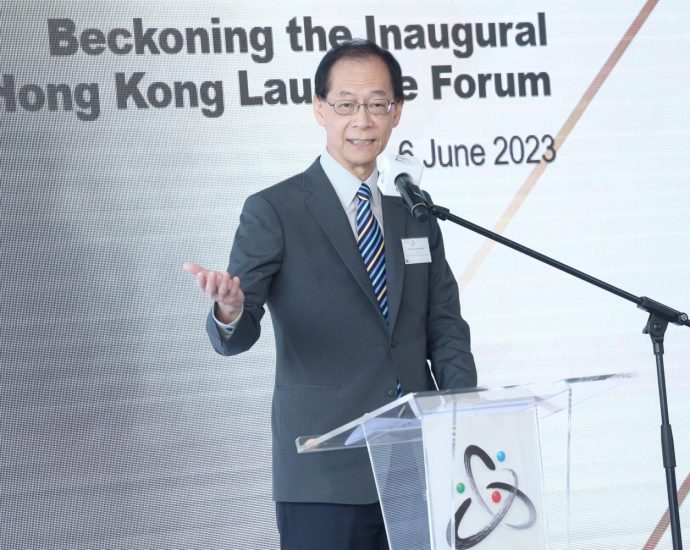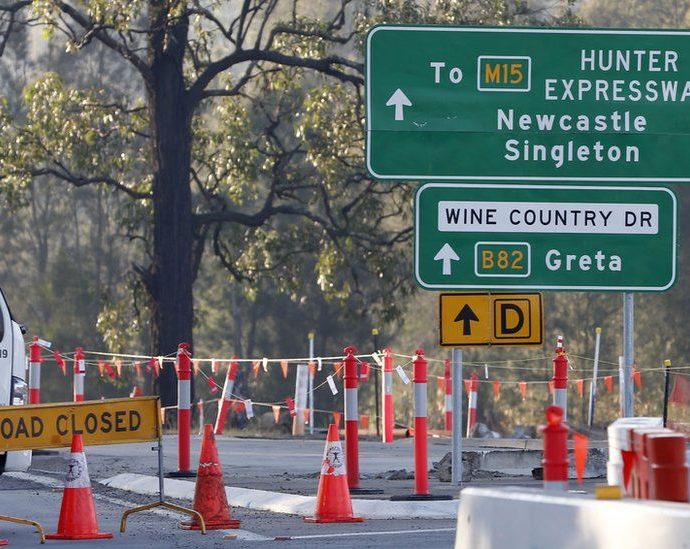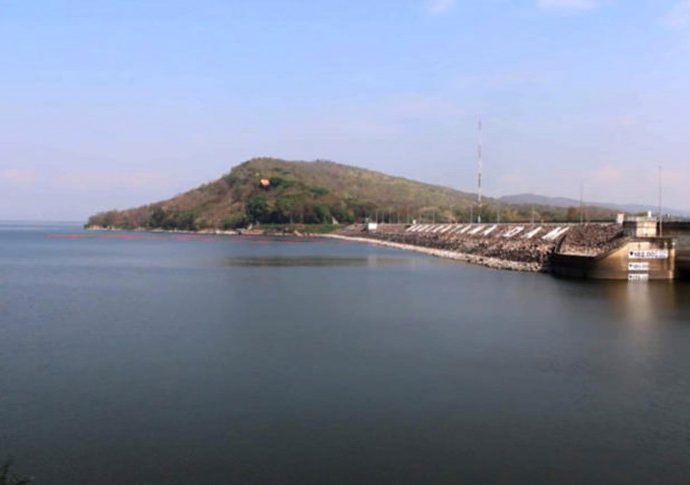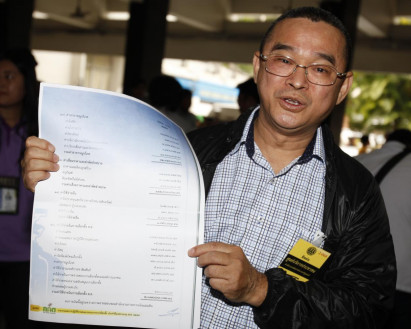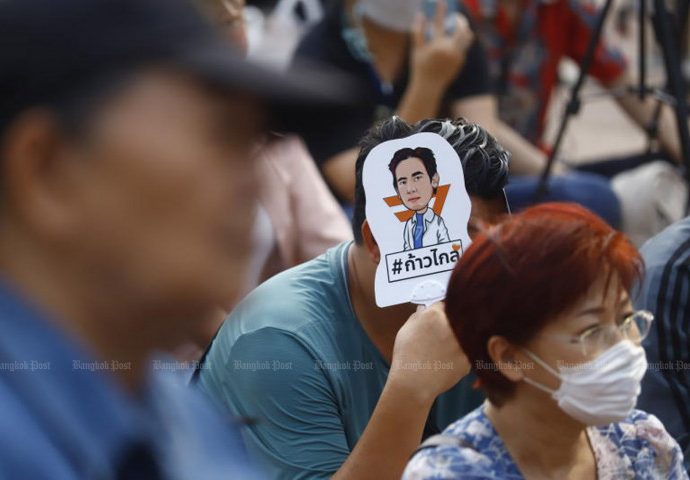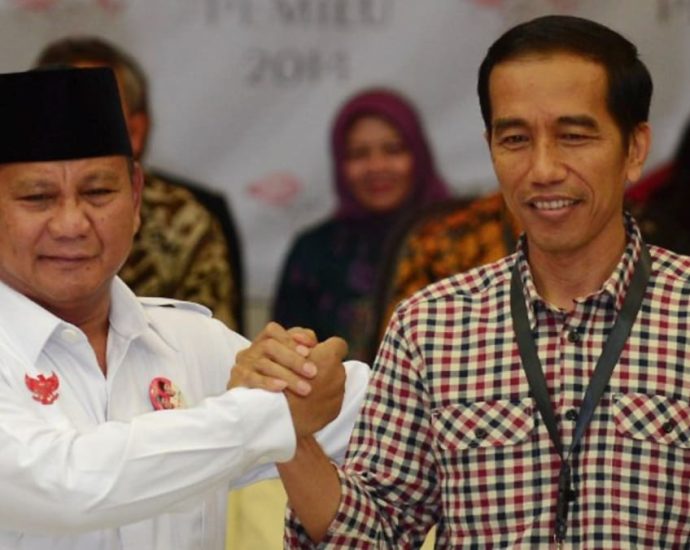Nuclear arms spending, arsenals swell as global tensions grow: Studies
GENEVA: The world’s nuclear powers, and China in particular, increased investment in their arsenals for a third consecutive year in 2022 amid swelling geopolitical tensions, two reports showed on Monday. The world’s nine nuclear-armed states jointly spent US$82.9 billion on their arsenals last year, with the United States accounting forContinue Reading
China expands nuclear arsenal as global tensions grow: Study
“The stockpile is the usable nuclear warheads, and those numbers are beginning to tick up,” Smith said, while noting that numbers are still far from the over 70,000 seen during the 1980s. The bulk of the increase was from China, which increased its stockpile from 350 to 410 warheads. India,Continue Reading
Arikomban: How two states are struggling to contain a rice-loving elephant
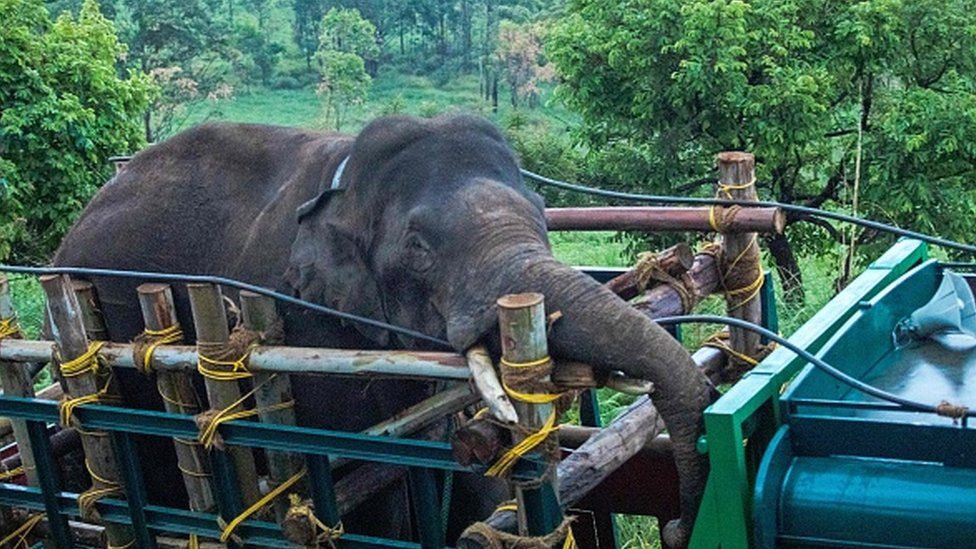 Getty Images
Getty ImagesIn just over a month, a wild elephant in India has been captured twice, tranquilised multiple times and relocated over 280km (173 miles) away from its native forest in a bid to keep it away from human settlements in search of food.
Arikomban (“rice tusker” in the Malayalam language) – named for his raids on local shops for rice – has been relocated in the southern states of Kerala and Tamil Nadu even as authorities grapple to secure a permanent habitat. The elephant has also been at the centre of legal battles and a debate on animal rights.
In Kerala, Arikomban has become a “symbol of resilience in the face of injustice,” says activist Sreedevi S Kartha.
“Events have shown how brutal the process of translocation can be for an elephant,” she told the BBC. “It has sparked the conscience of people in the state.”
Earlier this year, a group of locals near Arikomban’s original habitat, Chinnakanal in Kerala’s Idukki district, demanded his relocation after frequent run-ins with humans led to protests.
Officials say the elephant has killed several people over the years – a claim refuted by local tribal communities.
Kerala’s forest department announced that it planned to capture Arikomban and make him a trained captive elephant. Rights activists filed a petition with the high court, urging intervention to ensure the safety of the animal.
Ms Kartha, a member of People for Animals, one of the groups that filed the plea in court, says the government provided no evidence of the elephant killing humans.
In April, a court-appointed committee of experts decided it would be better to translocate the tusker.
Over two days, 150 officials carried out a massive operation in Chinnakanal to capture Arikomban. On 29 April, the elephant was moved to the Periyar Tiger Reserve about 80km (50 miles) away.
Barely a month later, forest officials in Tamil Nadu, the neighbouring state, found themselves undertaking a similar operation to relocate the animal once more.
The tusker had been spotted in the state’s Cumbum town on 27 May. Videos on social media showed the animal running through the densely populated town, damaging buildings and vehicles. Three people were injured – one of them, a 65-year-old man, succumbed to wounds two days later. Curfew was imposed as authorities tried to capture the elephant.
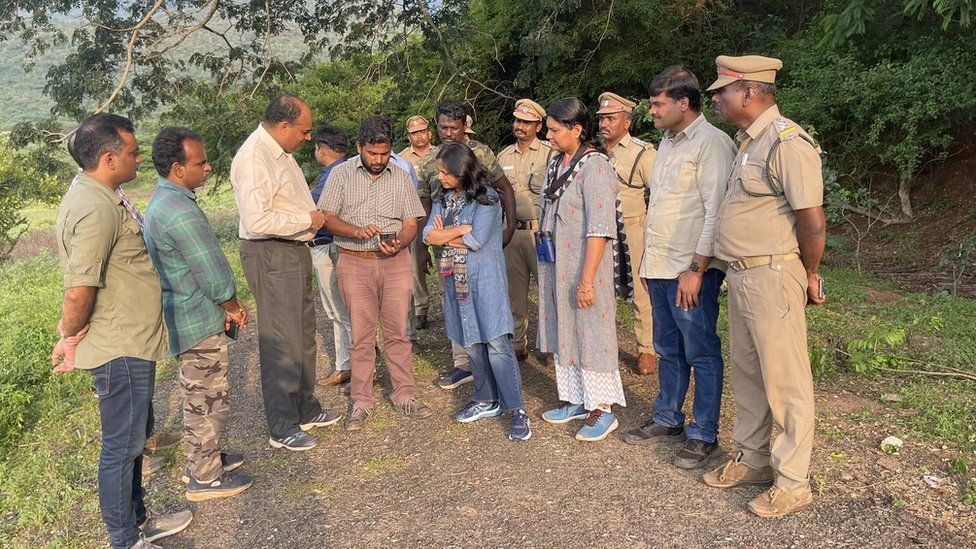
Arikomban now found himself at the centre of court battles. A politician filed a petition in the Kerala High Court asking for the elephant to be brought back to the state. A petition in the Madras High Court sought compensation for the damages he had caused in Tamil Nadu.
Kerala’s forest minister, AK Saseendran, said the crisis vindicated his government’s plan to make Arikomban a captive elephant and blamed activists for the elephant’s translocation.
But the Cumbum incident showed that Arikomban was not a threat to human life, Ms Kartha says. “He was traumatised and chased but did not attack human beings there.”
On 5 June Tamil Nadu’s forest officials tranquilised and captured the tusker. Visuals of Arikoban’s latest capture raised concerns about the number of times the tusker had been tranquilised and the injuries the animal had suffered as he was transported by officials in an open truck.
Stephen Daniel, a wildlife activist, said that the animal was paying the price for policy decisions by government that led to human settlements on the path of elephant routes.
“The mental and physical agony the animal was undergoing is unfathomable and the forest departments of the two states have a lot to answer for,” he said.
Back in Kerala, tribal groups in Chinnakanal have demand that the elephant should be returned to its original habitat. They plan to approach the courts to bring the tusker back.
“What is the need to capture and shift the elephant to the tiger reserve if it is made to suffer in such a manner?” one protester told the news channel Malayala Manorama.
Tamil Nadu’s forest department said Arikomban had been relocated deep inside Kalakkad Mundanthurai Tiger Reserve, over 200km (124 miles) away from Cumbum.
Reports said locals living nearby protested its relocation, worried that the tusker could wreak havoc in their settlements.
Supriya Sahu, a Tamil Nadu forest official, said the translocation had been “successful”. His new habitat had “dense forest and plenty of water” and the elephant was eating well, she said in an update on Twitter.
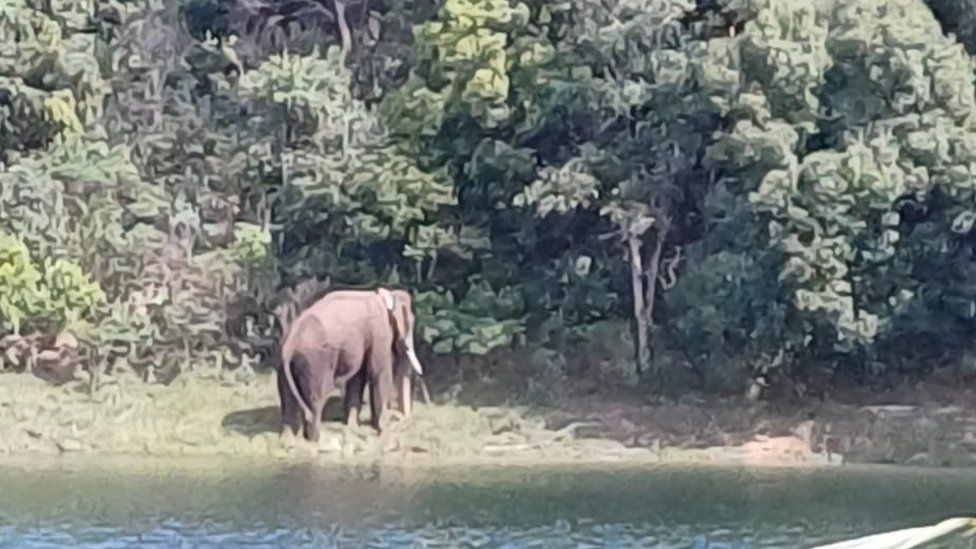
The state’s forest personnel were also camping in the reserve, monitoring Arikomban’s health and tracking his movements.
“He’s in good health and his wounds have healed,” forest official Srinivas Reddy told BBC Tamil last week.
But recent events prove the elephant will return to residential areas even after it is moved deep into the forest, Mr Saseendran told reporters.
“Translocation is only a temporary solution,” he said. “We can’t say the tusker won’t return to Kerala.”
Forest officials in Kerala remain on alert in case Arikomban ventured close to the state’s borders.
“Elephants have strong homing instincts,” Ms Kartha says. “Arikomban has been trying to come back home ever since he was first translocated [in April].”
“If he ventures back to human settlements, bring him back to Kerala – that’s the only permanent solution,” she says.
With additional reporting by Meenu Mathew.
BBC News India is now on YouTube. Click here to subscribe and watch our documentaries, explainers and features.

Read more India stories from the BBC:
- The divisive debate over California’s anti-caste bill
- Delhi: The city where it is dangerous to breathe
- Why it took 42 years to convict a 90-year-old in India
- Haunting images of deadly India train crash in 2002
- How did three trains collide in India?
- ‘My mother was missing, I got a picture of the body’
Related Topics
Youngsters to meet Shaw Prize winners

The inaugural Hong Kong Laureate forum will be held in November, with more than 20 Shaw Prize scientists set to exchange research and ideas with about 200 young scientists from 30 countries, including Thailand.
The forum, to be held from Nov 13–18, will serve as a world-class scientific exchange and networking event to nurture science leaders, according to the Hong Kong Laureate Forum (HKLF), which is organising it.
The forum was originally meant to be held in 2021, but postponed due to the Covid-19 pandemic.
Timothy Tong, chair of the HKLF, said the forum aims to foster exchanges among cross-generational, cross-cultural and cross-disciplinary scientists to promote science in Hong Kong and beyond.
“The HKLF has held a number of activities to create platforms for the local scientific research community to share with youngsters and participating Shaw Laureates, with thousands of young future scientists connected with the network,” he said.
More than 20 Shaw Prize winners from the fields of astronomy, life science and medicine and mathematics will gather in Hong Kong to share their knowledge with young scientists, he said.
The Shaw Prize is an annual award presented by the Shaw Prize Foundation. Established in 2002 in Hong Kong, it honours scientists for their academic and research contributions.
Previous recipients have come from the United States, United Kingdom, France, Germany, China, Japan and Israel.
Among the 200 young scientists expected to attend the forum is a Thai scientist in the biomedical engineering field.
The HKLF has been supported by the Lee Shau Kee Foundation since its launch in 2019, while the Shaw Prize Foundation, which organises the annual event, is also a main partner.
Sun Dong, Hong Kong’s Secretary for Innovation, Technology and Industry, said the government backs the work of the HKLF and the hosting of the forum to showcase tech development in Hong Kong.
Colin Lam, director of the Lee Shau Kee Foundation, said businessman Lee Shau Kee had set up the organisation to give back to society and support the work of the HKLF.
Hunter Valley: Ten people killed in wedding bus crash in Australia
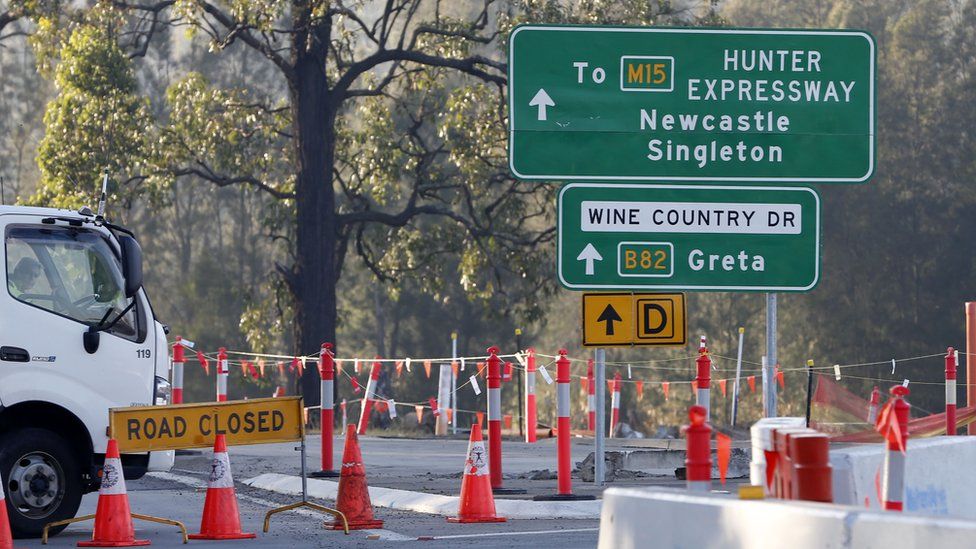 EPA
EPAAt least 10 people have died and 25 others are in hospital after a wedding bus crashed in Australia’s wine region.
The passengers were returning from a wedding at a winery on Sunday night when their coach overturned on Wine County Drive near Greta in Hunter Valley, New South Wales.
Police have launched an investigation into the circumstances surrounding the crash.
The driver of the bus, a 58-year-old man, has been arrested.
NSW Police Acting Assistant Commissioner Tracy Chapman said the guests were travelling to Singleton “presumably for their accommodation”. The crash occurred around 23:30 local time.
The number of fatalities could increase, with 25 passengers taken to hospital – two of them airlifted from the crash, Ms Chapman said. She added that the bus is still on its side and people could be trapped underneath.
Ms Chapman said there was “sufficient information” for police to charge the coach driver.
“He’s under arrest. He’s been the driver of a motor vehicle collision where there have been fatal injuries and there will be charges pending,” she said.
Australian Prime Minister Anthony Albanese said it is “so cruel, so sad and so unfair” for a “joyous day in a beautiful place like that to end with such terrible loss of life”.
“People hire a bus for weddings in order to keep their guests safe, and that just adds to the unimaginable nature of this tragedy,” he said at a press conference in Canberra.
Mr Albanese said some of the injured passengers are at John Hunter Hospital, but many have been flown to Sydney.
NSW Premier Chris Minns said the loss of so many lives was “nothing short of heartbreaking”, adding: “For this horrific crash to have occurred on a day that should have been filled with love and happiness only adds to the heartbreak”.
“For a day of joy to end in such devastating loss is cruel indeed. Our thoughts are also with those who have been injured,” he said.

Hunter Valley is known for its vineyards and native bushland, making it a popular spot for wine tourists and group outings.
A guest at the wedding said the day had been a “fairy tale” until news of the accident broke.
“We all started panicking,” he told 7 News.
Police said they are still working to identify the crash victims and contact their next of kin.
“Family and friends of a person who may have been on board the bus are urged to contact Cessnock Police Station,” they said in a statement.
Related Topics
Usable water down in Northeast dams

The volume of usable water in Khon Kaen’s Ubolratana Dam has dropped by 11% due to the insufficient number of wastewater treatment plants that could process runoff discharged by the agriculture and industrial sectors in the region, according to the Office of National Water Resources (ONWR).
Surasri Kidtimonton, ONWR secretary-general, said officials are still working on the inundation and drought mitigation plan for the Chi River basin area, which covers about 12.85 million rai of land in Kalasin, Khon Kaen, Maha Sarakham, Mukdahan, Yasothon, Roi Et and Udon Thani.
From May 1 to Oct 31, the dam will release water downstream to help maintain water supplies for five Provincial Waterworks Authority offices that cover 45 villages. The release will also support 10 industrial sites along the Pong River.
Mr Surasri said the Ubolratana Dam, the largest irrigation reservoir in the Northeast, currently holds about 789 million cubic metres (m³) of water — or 32% of its total capacity of 2.43 billion m³ — of which only 207 million m³ is usable water. This is about 11% lower than last year’s 220 million m³, he said.
The ONWR said many areas in the central Chi River basin regularly face water-related problems, such as floods during the rainy season, water shortages in the dry season and water quality issues.
“The ONWR have learned that the area’s low water reserves are mainly caused by the insufficient number of water treatment plants to process discharges from farms and factories, as well as runoffs from the North,” he said.
A check on the Chi River basin showed the water volume of Chulabhorn Dam in Chaiyaphum remains at 61.5 million m³, only 39% of which is usable, while the Lam Pao Dam in Kalasin remains at 768 million m³, 87% of which is usable.
Those areas regularly face inundation, intermittent rain and water-related environmental issues each year, particularly drought that has affected about 7.47 million rai of land.
Overall, the area’s dams and reservoirs can hold about 2.47 billion m³ of water, but the region requires at least 3.37 billion m³ of water consumption to support daily activities including farming, industry and tourism, according to the ONWR’s latest estimate cited by Mr Surasri.
He also said the Thai Meteorological Department estimated the amount of rainfall may be lower than average this year due to El Nino.
State agencies will come up with a new water management plan for next year, he added.
‘Giant killer’ targets MFP leader
Ruangkrai denies plot to block Pita Limjaroenrat’s bid for top job, writes Aekarach Sattaburuth
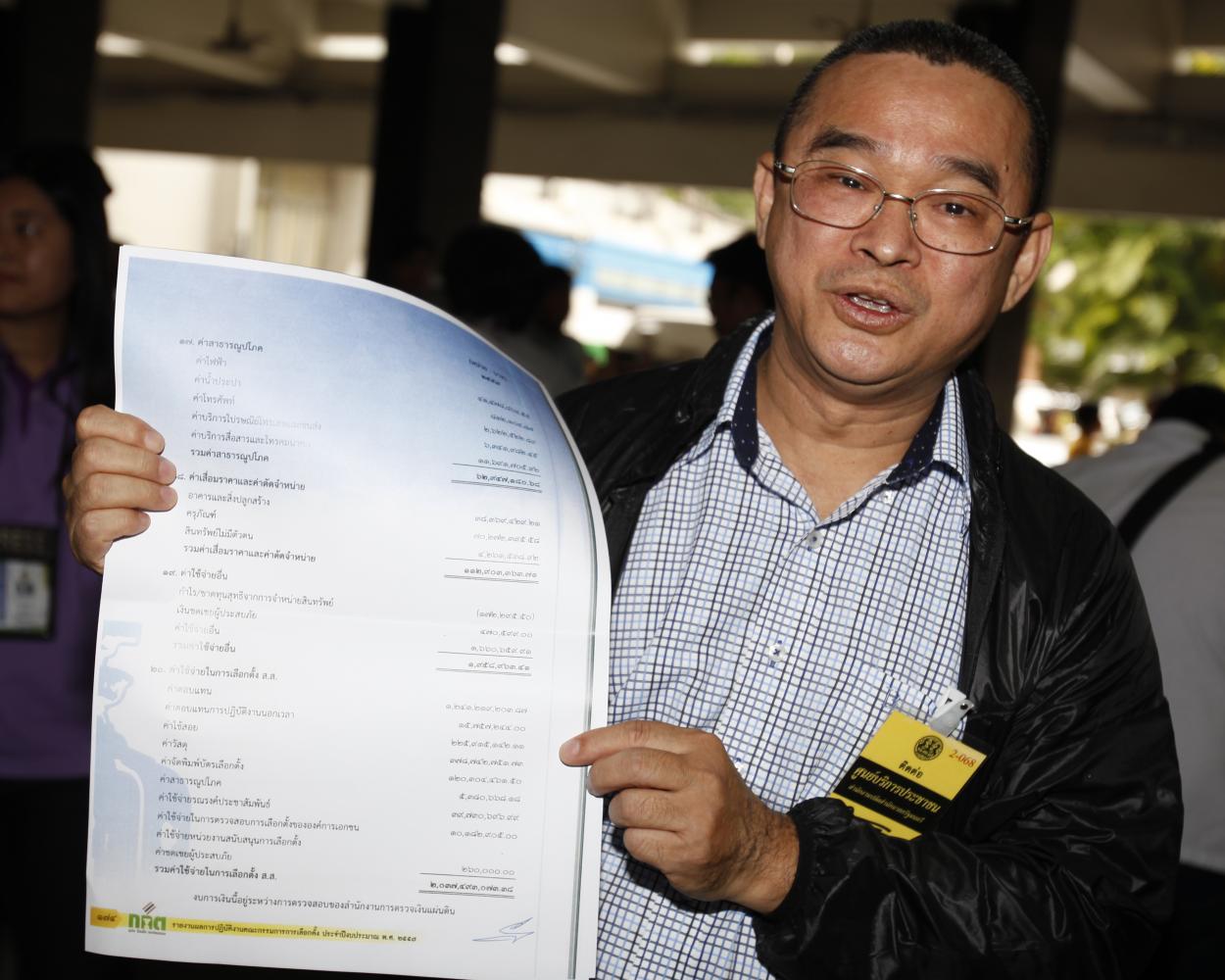
Politician Ruangkrai Leekitwattana is known for his skill in scrutiny and earned his “Jack the Giant Slayer” nickname when his petition led to the ouster of the late Samak Sundaravej as prime minister in 2009.
The high-profile petitioner recently sought to reprise that role when, shortly before the May 14 general election, he asked the Election Commission (EC) to investigate Move Forward Party (MFP) leader and list-MP candidate Pita Limjaroenrat for owning shares in a media firm.
His crusade against graft has seen him target key public figures including politicians and state officials, dating back more than two decades, but it was a tax dispute with the Revenue Department in 2006 that put Mr Ruangkrai in the media spotlight.
He was ordered to pay tax on shares received from his father who transferred them outside the stock market. Mr Ruangkrai paid the tax but the department later notified him that the purchase was in fact not liable under the Revenue Code and sent him a tax refund cheque.
At that time then prime minister Thaksin Shinawatra was under fire after members of his family sold Shin Corp shares in a 73-billion-baht deal to Singapore’s Temasek Holdings. The Shinawatras did not pay tax on the transaction.
Mr Ruangkrai, who graduated with a bachelor’s and a master’s in accountancy, used the case to highlight a double standard and his work caught the eye of then auditor-general Jaruvan Maintaka, a graft-buster who invited him to work as her adviser. Following the 2006 coup he was appointed as a senator and was part of the “Group of 40” senators.
His relationship with Khunying Jaruvan took a twist when the latter refused to retire at the age of 65 despite a Council of State ruling calling on her to step down.
Citing an order from the Council for National Security, the 2006 coup-maker, Khunying Jaruvan said she should continue in the job until a new auditor-general was selected as her departure would cause technical and legal hiccups to the office’s work.
Mr Ruangkrai asked the Ombudsman to investigate Khunying Jaruvan’s status and petitioned the National Anti-Corruption Commission to look into her assets.
But his signature achievement was the downfall of Samak.
He filed a case with the Constitutional Court in 2008, accusing the late prime minister of having a conflict of interest when he hosted a TV cooking show. The court ruled in his favour and removed Samak from office.
In 2010 Mr Ruangkrai was spotted at gatherings of red-shirt members who were supporters of Thaksin. He became a list candidate for the Pheu Thai Party in the February 2014 election which was later nullified by the Constitutional Court.
The 62-year-old political activist kept a low profile after that and returned to Pheu Thai when Khunying Sudarat Keyuraphan served as the party’s chief strategist. After a change of guard in the party, he was dropped from consideration to join a committee vetting the 2021 budget bill.
Mr Ruangkrai quit Pheu Thai, and served as a member of the budget scrutiny committee under the quota of the Seri Ruam Thai Party.
To many people’s surprise, he defected to the Palang Pracharath Party (PPRP) and worked on the committee vetting the 2022 budget bill.
Prior to his defection, he petitioned the NACC to look into a collection of amulets held by Prime Minister Prayut Chan-o-cha and luxury wristwatches belonging to PPRP leader and Deputy Prime Minister Prawit Wongsuwon.
His current campaign is being viewed by observers as politically motivated to block the MFP leader’s bid to become the prime minister and thwart the party’s efforts to lead the next coalition government.
Mr Ruangkrai shrugged off the criticism, saying he had obtained information about Mr Pita’s shareholding and spent weeks checking the facts before lodging the petition.
“Is anyone else known to own media shares? Mr Pita’s name came up, so we must look into it. I’ll do the same with politicians from other parties. But to my knowledge there are none,” he said.
The MFP leader can sue him for making a false complaint if the allegations prove groundless, he said.
Asked about him switching political camps, the political activist said he puts the law before party affiliation, and he had resolved to maintain and observe righteousness since he first joined the civil service in 1984.
Mr Ruangkrai said scrutiny of political figures including Mr Pita is based on criteria set out in the 2017 charter.
“That’s how I work. It’s not the right thing to turn a blind eye to those on my side and go after my rivals. My fellow senator complained when I lodged a complaint against him, so I reminded him I had already warned him to behave.
“But I’m not the one who decides their fate. It’s the court,” said Mr Ruangkrai.
MFP survives first calls for dissolution
EC throws out lese majeste petitions

Four recent petitions along with a request to dissolve the Move Forward Party (MFP) have been dismissed as groundless and no reason for dissolution by the Election Commission (EC), according to a source.
The dismissal of the petitions to dissolve the MFP was made while the eight-party coalition led by the MFP goes about forming a new government.
Election Commission (EC) secretary-general Sawaeng Boonmee, in his capacity as the registrar of political parties, did not agree that on March 5 Padipat Suntiphada, the MFP candidate in Constituency 1 of Phitsanulok, had contravened EC regulation 17 by mentioning the royal institution, said the source.
The petitions also dealt with the MFP’s desire to amend or abolish Section 112 of the Criminal Code, better known as the lese majeste law, said the source.

Sawaeng: ‘No merit to accusations’
Alleged manipulation by Thanathorn Juangroongruangkit and Pannikar Wanich, the leader and the spokeswoman of the Progressive Movement respectively who advise the party but are both considered outsiders, was also cited as an alleged violation of the organic law on political parties, said the source.
Although the EC’s latest decision appears to be good news for the party, analysts and legal experts say that’s not the end of the party’s problems.
Jade Donavanik, a legal scholar and former adviser to a constitution drafting committee, said the EC’s planned inquiry into MFP leader Pita Limjaroenrat’s alleged violation of Section 151 of the organic law on the election of MPs, for instance, will likely bring both advantages and disadvantages to the party.
As the Section 151 matter will have to be forwarded to the court as a criminal case, the EC will have the burden of proving Mr Pita had violated the law, while Mr Pita will have to defend his innocence, said Mr Jade.
Asked to assess evidence shown by Mr Pita pertaining to his holding of shares in iTV Plc as reported by the media, Mr Jade said the chance of Mr Pita winning the case is still fifty-fifty.
In a Facebook post, Mr Pita on Sunday said: “I’ve tried my best…What about you?” The new post was accompanied by his old message posted on Facebook on June 24, 2021 in which he described Thailand as being in a legal war.
Senator Seree Suwanpanont, in his capacity as chairman of the Senate’s committee on political development and public participation, said the EC has failed to state clearly what will happen next if it finds Mr Pita guilty.
At a meeting of the Senate committee scheduled for June 20, the committee will review the EC’s order regarding its inquiry against Mr Pita and discuss it in detail, he said.
On Friday, the EC decided to conduct the inquiry over whether Mr Pita had applied as a list-MP candidate despite knowing he may not have been eligible to run for a House seat.
On the same day, the EC dismissed all petitions asking it to probe whether Mr Pita’s holding of iTV shares made him ineligible to contest the election in the first place, reasoning they were lodged after the qualifications of election candidates were examined. This has upset some of the party’s critics.
Political activist Ruangkrai Leekitwattana, meanwhile, said he will formally appeal against the EC’s decision to dismiss his petition.
He said he lodged his complaint with the election regulator on May 10 and still believes a petition about the suspected ineligibility of Mr Pita could still be submitted even after the EC endorses Mr Pita as an MP.
More importantly, he said, the EC is responsible for forwarding the matter to the Constitutional Court.
Mr Ruangkrai said he has solid evidence to prove that Mr Pita has held 42,000 iTV shares since 2008 which made him ineligible to contest the election.
He also accused the EC of failing to answer several questions he raised about Mr Pita’s alleged ineligibility in the rejected petition and is now determined to seek a definite answer.
Commentary: Why Prabowo Subianto is winning over young Indonesian voters in a three-way race
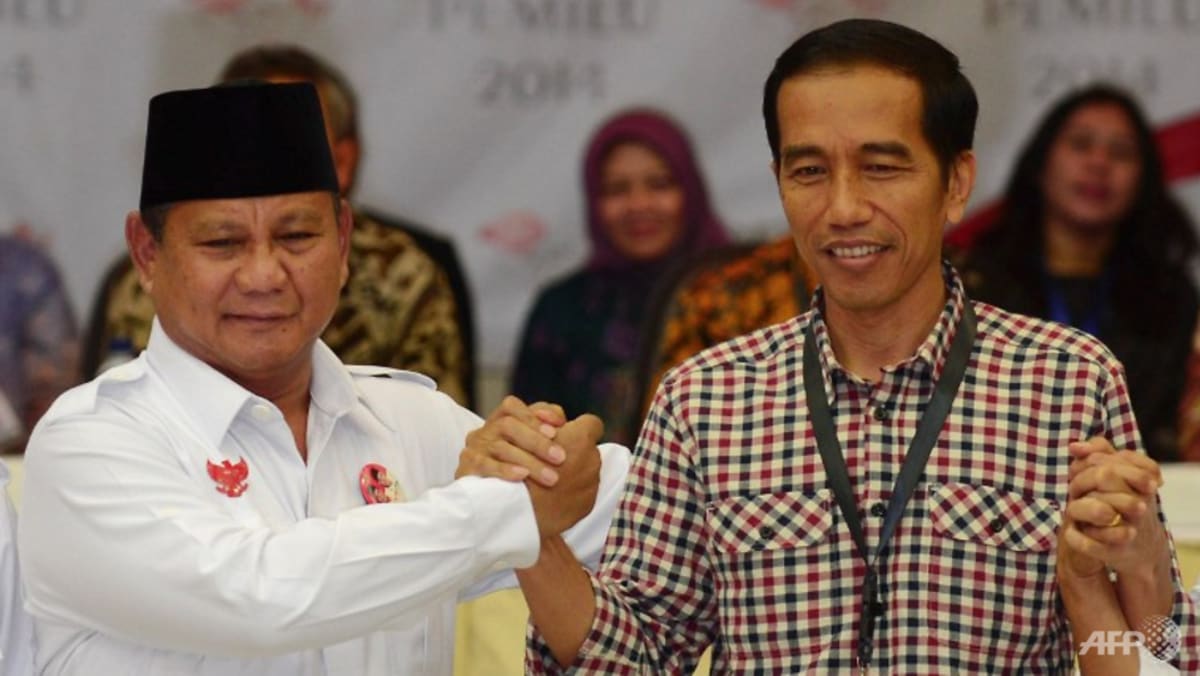
And while it’s just one poll 10 months before the vote and conducted in the aftermath of PDI-P’s disastrous intervention in the U-20 FIFA football event in Bali, the trend has alarmed activists and progressives. A refusal to investigate or even revisit serious and credible allegations of human rights abuses is a feature of the political elite across Southeast Asia.
This has continued in Indonesia under the Joko Widodo, or Jokowi as he is commonly known as, presidency despite hopes in 2014 that his election win would bring answers, if not cases against perpetrators, for the families of victims of alleged state-backed violence.
APPARENT ABSOLUTION FROM PRESIDENT JOKOWI
Indeed, those unanswered allegations were a major aspect of the Jokowi campaign against Prabowo in both 2014 and 2019. That the president tapped his former challenger to join the Cabinet as defence minister shortly after winning his second term underscored criticism that Jokowi had abandoned many of his pre-2014 progressive promises and that the PDI-P had feigned concerns about human rights abuses.
Jokowi spent much of the first half of this year championing Prabowo’s 2024 candidacy with high-profile visits and social media posts. Whether that was to back his minister or to pressure PDI-P boss Megawati Sukarnoputri to name Ganjar is still debated.
PDI-P is still suffering from its bumbling youth football catastrophe, undermining faith in the party’s ability to read the will of the country, and with few other candidates and an apparent absolution from Jokowi, Prabowo has good reason to be feeling confident.
Erin Cook is a journalist covering Southeast Asia politics and curates the weekly Dari Mulut ke Mulut newsletter. This commentary first appeared on Lowy Institute’s blog, The Interpreter.
The Big Read: Buy local but at what price? Costlier Singapore produce could hamper quest for greater food security
Mr Tan of Blue Ocean Harvest said that since 2021, Blue Ocean Group has established three food and beverage outlets specialising in Chinese cuisine, particularly fish soup, which uses fish harvested from the farm. Mr Nicholas Goh, founder of Nature’s International Commodity, said that it “makes little sense” to pushContinue Reading



